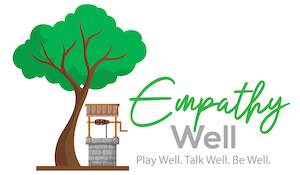Parents are given a lot of advice. Like a lot of advice. You can check any social media site and you’re going to get guidance on what foods to help your child be healthier, smarter, and happier. You’re going to read what toys are best for your child’s learning. You’re going to hear endless number of ways to help your child calm down when they are upset or discipline them when they behave badly. The sea of information on parenting can be overwhelming. And often this advice leads to parents feeling insecure about their parenting because they realize there is no way to be the perfect parent. And this realization is the truth: There is No Way to be the Perfect Parent! The good news is that your child doesn’t need a perfect parent. Your child just needs you.
I started working as a counselor with parents when I was 22 years old (Crazy, right?), way before I was a parent and way before I had enough life experience to know what parenting is actually like. I remember thinking, “Why can’t these parents just do what I tell them to do? If they would just follow these tips that I give them from the books I’ve read, then they and their children would be so much happier.” Life had many lessons to teach me. My own children had so many lessons to teach me because I seemed to rarely be able to access all my book knowledge when it came to my own parenting struggles. In addition to my own children, the parents and children that I have worked with over the last 32 years have been the greatest influential teachers in instructing me on what works in parenting.
And this is what I have learned…
There is one tool that is the most powerful in parenting and works in every situation, no matter what. It is a simple tool, one that every parent can use, takes little time, and costs no money. The tool is called “reflective listening.” Reflective listening is a simple concept. I listen to what my child is saying, observe how my child is behaving, or notice how my child is feeling then I reflect back what I see or hear to my child.
Here are some examples:
I ask my child to take out the trash, and my child responds by saying “Why do I always have to take out the trash? I’m tired of having to do everything.” I would respond through reflective listening by saying, “You really don’t like taking out the trash.”
My child is excited about being asked to go to a party but worried about what to wear, I would respond by saying, “You’re super excited about this party but you’re feeling that you may not have the right clothes for it.”
My two children are arguing for the 5th time of the day, I would respond by saying, “You guys are angry with each other and having a hard time getting along today.”
You’ll notice in each of these examples that I do not try to fix the problem, discipline my child, or make my child feel better. I simply respond by noticing how my child is feeling or what they are saying. So, you may be wondering how this can possibly be helpful and why a parent wouldn’t want to tell the child to stop complaining and take out the trash anyway, explain that we don’t have the money for new clothes right now, or send the argumentative siblings to separate parts of the home. The following are reasons why reflective listening is powerful, effective, and always works.
Your Child Feels Heard.
All people want to feel seen and understood. It is a basic part of human nature that we want to feel that we have a place of belonging in the world and that sense of belonging starts in our parental relationships. When a parent hears or notices what is happening with their child, the child feels a personal sense of worthiness. Reflective listening sends the message to your child that what they say and feel matters to you.
You’re Sending a Message of Empathy.

Empathy is the ability to understand another’s situation or feelings, walking in another’s shoes. Children learn empathy by receiving empathy. Research has shown that the development of empathy in children is the mechanism by which they refrain from hurting others and learn to nurture others. Reflective listening is a way to communicate empathy with children. When I stop to reflect “you really don’t like taking out the trash,” I send the message that I understand taking out the trash is not fun for you and seems like too much work. I am not saying that I agree that taking out the trash is hard but I am saying that my child is experiencing it as hard in this moment. My ability to set aside my own feelings and beliefs about taking out the trash and walking in my child’s shoes sends a message of care to my child. As my child receives messages of care throughout their childhood, they are more likely to send those messages to others.
Your Child Is More Likely to Stop and Reflect on Their Feelings and Behaviors.
So, here’s a secret that all therapists know. Therapists use reflective listening to help clients stop to reflect on their thoughts, behaviors, and feelings in order to become more careful and intentional in their decision-making. When a child hears their thoughts, words, behaviors, or feelings reflected back to them, it is like looking in a mirror. Except that this time, it is a caring, nurturing mirror (i.e., the parent) who accepts those feelings without judgment. Your child will be more likely to regulate their feelings and behaviors so that their next steps will be more intentional, and in turn, more positive. In the example of taking out the trash, if I reflect back that “you really don’t like taking out the trash,” the child feels heard and cared about. It is more likely that the next step is that they will grumble while taking out the trash rather than complete refusal.
You Are Putting Relationship First in Parenting.
If the goal of the parent is get the child to do what you want them to do, then reflective listening is not going to always move toward that goal. But if the goal is to maintain a thriving and warm parent-child relationship, reflective listening will always work. Parenting is long-game endeavor. What you do now as a parent when your child is 5, 8, 12, or 16 has dividends for years to come. When you engage in reflective listening, your child may not always respond in a way that you would like. You may even need to move to disciplinary measures after you reflect but your child will know that you stopped to understand and show care for them in their happiest and most unhappy of times. And this is the part that will be remembered by your child. So, there is no losing in reflective listening.
Conclusion
In the world of parenting, reflective listening serves as the most powerful multipurpose tool in the toolbox. Reflecting a child’s words, actions, and feelings can be done any time in any situation so it is also an easily accessible tool. The next time your child throws themselves on the floor in a tantrum, yells a refusal, or cries about a worry, try to sit next to them and reflect what they are doing or feeling. I think you’ll see reflective listening is more powerful than any hammer or drill you have ever used.




